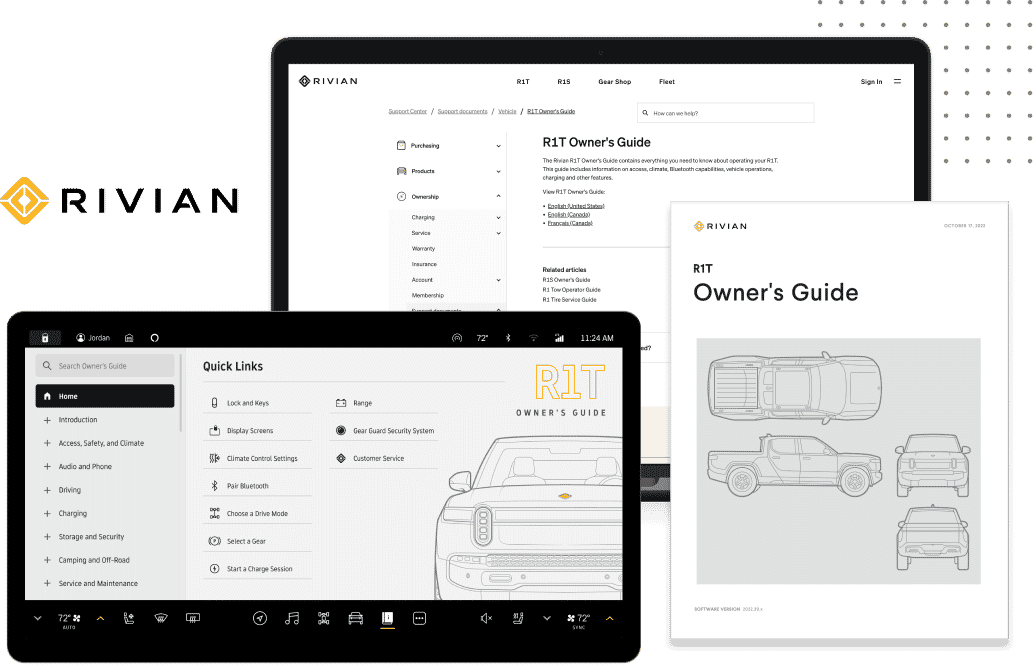Customer Success Story
Humber College Uses MadCap Flare to Deliver Online Humanities Course Linked to Blackboard and Supplemental CD
Goals
- Enrich students' learning via online class and supplemental CD
- Create content without relying on IT professionals
- Seamlessly link with college's Blackboard education management system
- Upgrade security and quality of online content
- Migrate from RoboHelp
Benefits
- Easy-to-use WYSIWG functionality and MadCap support enable professor to develop and publish content as often as needed
- Topic-based authoring in Flare maps well to book orientation of teaching a course
- Simple WebDev connection gives students single- click access from Blackboard to Flare -based online class
- Flare enables robust security and consistent high-quality across both online class and CD
MadCap Software Solutions and Services:
The value of having college professors create and update the online versions of the courses they teach is undeniable. However, the technical complexity of some software solutions means that course development has to be turned over to IT professionals within the education system, who often face a backlog of requests.
Humber College Institute of Technology & Advanced Learning is addressing this challenge by using MadCap Flare to update and manage its online Humanities 024 course. Flare, MadCap's flagship software for multi-channel authoring, also is used to deliver a supplemental CD to accompany the class textbook.1 Humber College Humanities Professor George Byrnes, who created the online class and CD, selected Flare for its ease of use, modern native XML architecture, and ability to seamlessly link with the Blackboard Internet-enabled education management system.
One of the reasons I'm especially pleased with Flare–and one of the most important things–is how I deliver my course through Blackboard. It's so simple.
George Byrnes Humanities Professor, Humber College
"Blackboard is a very useful online system for posting updates about course work and facilitating communications between students and teachers. However, its online course authoring environment is quite complex, often requiring our IT professionals at Humber to help create the courses," said Professor Byrnes. "With MadCap Flare, I can easily create and update the humanities course myself, as often as I need, to provide my students the most timely and relevant resources available."
For nearly two decades, Professor Byrnes has developed course materials to complement the textbook and help his humanities students gain a deeper understanding of the subject matter while learning at their own pace. His first project was to create a supplemental CD with WinHelp. He then later began using Adobe® RoboHelp® to update the CD, as well as create an online class. However, technical difficulties with the RoboHelp-based CD, security issues with Adobe FlashHelp, and a decline in RoboHelp customer support led him to re-evaluate his choice of authoring software.
After reviewing several products, Professor Byrnes chose Flare for its modern architecture and easy-to-use features that would speed the learning curve.
"Flare is remarkably simple and provides the perfect what-you-see- is-what-you-get environment to set up an online course using text, links, and photos," says Professor Byrnes. With its topicbased approach to authoring, he adds, "Flare has the underlying metaphor of a book–using book icons to designate "chapters" of related topics–and that's a natural connection for most professors. I can set up books with pages and think of the folders as pages within a specific topic."
For example, the Humanities textbook has five units, but the course is taught over fourteen weeks. Professor Byrnes has chosen to create a chapter icon for each week, as well as additional chapters for Course Policies and other topics. When his online students login to the course and open the Flare-based Course Content Guide, they see the Chapter icons arranged by date. When clicked, each chapter icon opens to display the "Weekly Study Plan" topic immediately. This allows Professor Byrnes to orient his students for the week just as though he is standing before them in class. Equally important, this visual arrangement is exactly what Professor Byrnes sees when he is composing lectures and other course content.
As a result, Professor Byrnes notes, "My students and I are literally on the same page as they study and I teach."
One of Professor Byrnes' goals is to encourage students to work with the course material online, which incorporates some 800 HTML pages. Therefore, he has used the WebHelp format in Flare to set up online course material that is easy to read and contains active links to relevant source material.
"One of the reasons I'm especially pleased with Flare–and one of the most important things–is how easy it is to integrate a Flare project into Blackboard. When students sign onto the Blackboard system and click on the Course Content Guide, Flare is what they actually see," said Professor Byrnes. "To get this integration, all I had to do was log into Blackboard, setup a WebDev connection between Blackboard and my computer, and then move the Flare files to the outbound folder. It's so simple."
Another important advantage with Flare is MadCap's support, says Professor Byrnes, who notes, "I'm a Bronze support customer, and I recently had one of the technicians help me out. He was able to log onto my computer, look at my Flare project, and ferret out the lines of code to adjust. It was like watching a surgeon."
In addition to the online course, Professor Byrnes also has used Flare to update the CD that supplements the humanities textbook. Referring to it as "the X-ray of the textbook," he explains that the CD provides summaries of chapters and articles, Internet resources, definitions of 200 distinct terms, and cross-links.
"With Flare, all of my lectures can be cross linked, and they are amplified by all the rich educational resources available on the Internet today," Professor Byrnes noted. "It really points to the power of using authoring software, like Flare, that has been designed for online information delivery."
(1) The Human Project: Readings on the Individual, Society, and Culture, 4th Edition, Clive Cockerton and Melanie Chaparian, eds., Prentice Hall Canada





